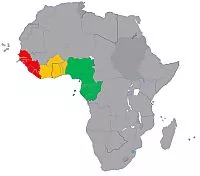Event
Cement prices rose in Nigeria by 44% in August shortly after Dangote Cement hiked its own price. A 50kg bag of cement used to cost about US$5 in the country. Now it costs about US$7.1
Main Finding
Dangote is the leading player in Nigeria's cement industry and wields the most influence among members of the Cement Manufacturers Association of Nigeria. When Dangote decides to push its price up or down, others tend to follow.
Prices have risen lately owing to the rising costs of fuel and a forex scarcity in the country. Power generation is usually only 2,500MW or less making supply highly infrequent and obliging manufacturers to generate their own power. Foreign exchange has been illiquid in the country due to weak export earnings, falling foreign investment and policy constraints. The combination has made things especially hard for manufacturers.
A source at Sokoto Cement, one of Dangote's main rivals, told Songhai Advisory, "Generating power gulps the bulk of our production costs. We use LPFO and right now it's about as expensive as diesel—and its price keeps rising. This is definitely the principal challenge we're facing. "The other main problem is foreign exchange. We have to pay more to procure facilities from overseas and maintain existing ones, and this increases the cost of doing business."
Next to the government, Dangote Group is the largest employer of labour in Nigeria with over 60,000 employees at Dangote Cement alone.2 Consequently, the Chairman Aliko Dangote is a political heavyweight who has maintained strong ties with the government from president to president. He's arguably the most powerful non-politician in the country and that weight is to his companies' advantage.
Chairman of rival Sokoto Cement Abdulsamad Rabiu claimed in February that the central bank was subsidising dollars to Dangote Cement while others in the industry barely got the same benefit.
Rabiu said, referring to Dangote Cement, "Whilst some manufacturers are experiencing extreme difficulty sourcing foreign exchange for legitimate business operations within Nigeria, others are getting forex to set up operations in other countries.
"We have so far expended money raised from our offshore sources to the tune of over $300 million for CCNN expansion and our second line at Obu, with little or no allocation forthcoming from the central bank. It is rather ironic that a similar competitor in the same industry, who incidentally is the market leader, is allocated huge amounts of Nigeria's hard earned and scarce forex from the official market for its operations in Congo."3
Dangote intends to overtake Lafarge as Africa's largest cement giant and it's been investing broadly in over a dozen African markets including Kenya, Zambia and Ethiopia.
Last year Dangote opened its new cement plant in Muger, Ethiopia with a production capacity of 2.5 million tonnes per year. The plant is the largest cement plant in East Africa and was commissioned by Ethiopian Prime Minister Hailemariam Desalegn. Standing next to Aliko Dangote that sunny afternoon was Godwin Emefiele, governor of Nigeria's central bank.
Outlook
Dangote Cement in Nigeria imports LPFO to fire its three plants because there's often a shortage in the country, but the firm is investing in coal as a cheaper alternative.
It said in August, "We have accelerated installation of our coal mills—and now expect to begin mining our own coal in November. Own-mined coal will be cheaper than gas, which is priced in U.S. dollars but paid [for] in naira."4
Dangote has since cemented its towering lead in the Nigerian market. Its Obajana plant in the country is one of the largest in the world with a production capacity of over 13 million tonnes per year. Dangote's combined capacity from its plants in the country is nearly 30 million tonnes per year. Another plant with capacity of 12 million tonnes per year is also under construction in the country. 5
The firm's strategy now is to rapidly expand into 18 African countries6 and reach 75 million tonnes per year as output capacity on the continent by 2019. So even though its Nigerian revenue may flag because of the country's struggling economy, the firm is set to reap highly from the boom in other African cement markets, especially in East Africa.
Footnotes
1 http://guardian.ng/news/cement-price-rises-by-44-per-cent-hits-n2300-per-bag/
2 http://www.vanguardngr.com/2012/02/dangotes-cement-plants-generate-60000-jobs/
3 http://leadership.ng/news/502394/forex-abuse-bane-economic-growth-abdulsamad
4 http://www.bloomberg.com/news/articles/2016-08-31/dangote-cement-raises-prices-as-weak-naira-gas-supply-hit-costs
5 http://www.thisdaylive.com/index.php/2016/04/22/dangote-cements-pan-african-expansion-excite-shareholders/
6 Including Senegal, Cameroun, Congo, Ghana, Cote d'Iviore, Sierra Leone, South Africa, and Asia's Nepal.
The content of this article is intended to provide a general guide to the subject matter. Specialist advice should be sought about your specific circumstances.

